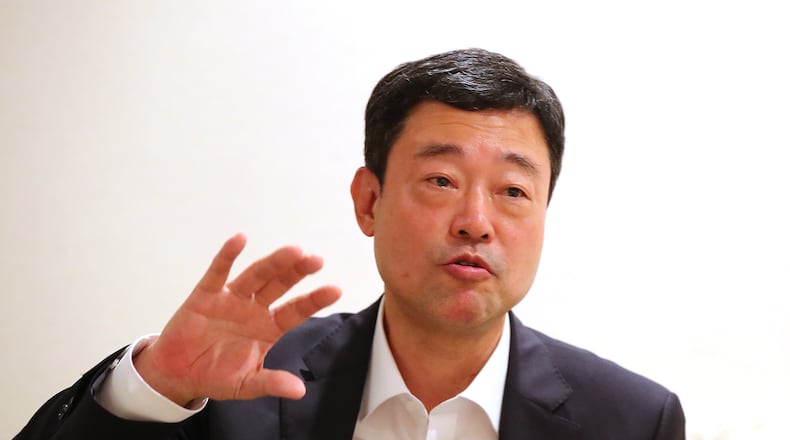SK Innovation executive Dong Seob Jee has two big concerns as his company builds an electric-vehicle battery plant in Commerce – hiring must get quicker and SK’s growth potential in Georgia could get even bigger.
South Korea’s SK is building a $2.6 billion factory on I-85 in Jackson County to make EV batteries for Ford and Volkswagen. It has hired 315 permanent U.S. workers for the plant, and 20 South Korean workers.
Jee wants to hire an additional 1,000 workers preferably by October, but no later than December, he said in an interview with The Atlanta Journal-Constitution. That deadline is necessary for production to begin on time next year.
Most new hires will be equipment operators, and chemical and mechanical engineers. Those employees need to be fully trained before production can begin. SK is relying on Georgia’s Quick Start workforce training program for assistance, Jee said Monday.
“We need to have them in place for three months” to receive training before work can begin, Jee, president of SK Innovation’s Battery Business, said through a translator.
Jee was in Georgia to visit the Commerce facility on Saturday with South Korean President Moon Jae-in and Gov. Brian Kemp. During the visit, Moon touted the growing economic ties between South Korea and Georgia.
SK is building its Commerce factory in stages and expects to complete all construction by the end of 2023. The plant will employ 2,600 full-time workers and its 21.5 gigawatt-hours of yearly production has been committed to Ford and Volkswagen, enough to supply about 430,000 vehicles per year.
Georgia could also be in line for another SK battery plant, one that would be about three times the size of the Commerce facility, Jee said.
SK and Ford on May 20 created a joint venture to produce about 60 gigawatt-hours of EV batteries per year. Ford will also continue to purchase EV batteries made by SK in Commerce.
SK and Ford have not chosen a location for the new plant, though Georgia is a finalist with Ohio, Tennessee and Texas. Jee declined to elaborate on the selection process.
The Commerce facility will be SK’s first EV battery plant in the U.S. It already operates plants in China, South Korea and Europe.
The Georgia factory will implement technologies that SK developed at its overseas factories that make it quicker and cheaper to produce EV batteries, Jee said. SK found a way to replace most of the cobalt in its batteries with a higher content of nickel.
Cobalt is more expensive than nickel and difficult to obtain. More than half of the world’s cobalt is mined in an area of the Democratic Republic of the Congo marred by armed conflict.
Human rights groups have also accused Congo mining companies of using child labor, though Jee said SK works with an independent third party to confirm that the cobalt it purchases does not involve child labor.
About the Author
Keep Reading
The Latest
Featured



